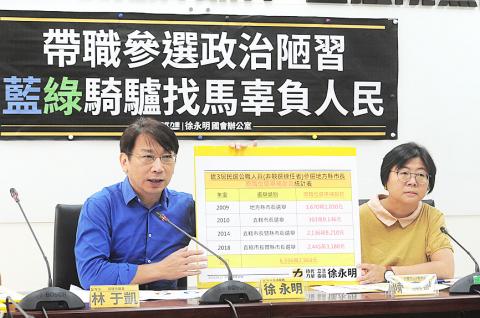The New Power Party (NPP) yesterday said that it would propose changes to the election laws that would require holders of public office to step down when running for other positions and to return the subsidy for the previous election if they do not resign by a certain date.
Draft amendments, if passed quickly, would require Kaohsiung Mayor Han Kuo-yu (韓國瑜), who has won the Chinese Nationalist Party (KMT) presidential primary, to step down as mayor and possibly to return an election subsidy of about NT$26 million (US$836,685) that he received after being elected.
Under the proposed amendments to the Civil Servants Election and Recall Act (公職人員選舉罷免法) and the Presidential and Vice Presidential Election and Recall Act (總統副總統選舉罷免法), holders of public office would need to relinquish their position starting the day they register to run for another position, NPP caucus whip Hsu Yung-ming (徐永明) said.

Photo: Wang Yi-sung, Taipei Times
Those failing to step down would need to return within 30 days the election subsidy of NT$30 per vote that they received after their original victory, he said, adding that the changes would apply to the president, vice president, city mayors, county commissioners, local councilors and legislators running for another position.
Current regulations on the election subsidy have turned elections into “a profitable business” for politicians, he said.
By running for president less than a year after being elected mayor, Han is expected to receive NT$200 million in subsidies for the two elections, Hsu said.
“Even if he loses the election, he can still stay at his original position and keep the initial subsidy,” he said.
The issue has gained public attention because of Han, but it is a common phenomenon, he said, adding that in the mayoral and commissioner elections of the past 10 years, 45 public officials ran for other positions without stepping down.
Of the 45, 20 were members of the KMT, 18 were from the Democratic Progressive Party and seven ran as independents, Hsu added.
They received NT$65 million in subsidies for their initial election campaigns, he said, citing Central Election Commission statistics.
“We hope to highlight the value of public officials resigning before they register to run for another position and encourage political parties to change the way that they select their candidates,” he said.
The NPP would never nominate someone who intended to keep their office while running for another position, he added.
Han had said that he would only deal with election affairs on the weekend, but to attend a news conference at the KMT headquarters on Monday, he had canceled a visit to a Rukai festival in Kaohsiung, NPP Kaohsiung City Councilor Lin Yu-kai (林于凱) said.
Han’s campaigning could make him unavailable to handle city affairs, he said, adding that polls show that 60 percent of Kaohsiung residents want Han to resign.
The NPP would propose the bill in September when the next legislative session begins, NPP Kaohsiung chapter head Chen Hui-min (陳惠敏) said.
The bill could be passed by mid-October, before candidates need to register for the presidential election in January next year, she added.

MAKING WAVES: China’s maritime militia could become a nontraditional threat in war, clogging up shipping lanes to prevent US or Japanese intervention, a report said About 1,900 Chinese ships flying flags of convenience and fishing vessels that participated in China’s military exercises around Taiwan last month and in January last year have been listed for monitoring, Coast Guard Administration (CGA) Deputy Director-General Hsieh Ching-chin (謝慶欽) said yesterday. Following amendments to the Commercial Port Act (商港法) and the Law of Ships (船舶法) last month, the CGA can designate possible berthing areas or deny ports of call for vessels suspected of loitering around areas where undersea cables can be accessed, Oceans Affairs Council Minister Kuan Bi-ling (管碧玲) said. The list of suspected ships, originally 300, had risen to about

DAREDEVIL: Honnold said it had always been a dream of his to climb Taipei 101, while a Netflix producer said the skyscraper was ‘a real icon of this country’ US climber Alex Honnold yesterday took on Taiwan’s tallest building, becoming the first person to scale Taipei 101 without a rope, harness or safety net. Hundreds of spectators gathered at the base of the 101-story skyscraper to watch Honnold, 40, embark on his daredevil feat, which was also broadcast live on Netflix. Dressed in a red T-shirt and yellow custom-made climbing shoes, Honnold swiftly moved up the southeast face of the glass and steel building. At one point, he stepped onto a platform midway up to wave down at fans and onlookers who were taking photos. People watching from inside

Japan’s strategic alliance with the US would collapse if Tokyo were to turn away from a conflict in Taiwan, Japanese Prime Minister Sanae Takaichi said yesterday, but distanced herself from previous comments that suggested a possible military response in such an event. Takaichi expressed her latest views on a nationally broadcast TV program late on Monday, where an opposition party leader criticized her for igniting tensions with China with the earlier remarks. Ties between Japan and China have sunk to the worst level in years after Takaichi said in November that a hypothetical Chinese attack on Taiwan could bring about a Japanese

The WHO ignored early COVID-19 warnings from Taiwan, US Deputy Secretary of Health and Human Services Jim O’Neill said on Friday, as part of justification for Washington withdrawing from the global health body. US Secretary of State Marco Rubio on Thursday said that the US was pulling out of the UN agency, as it failed to fulfill its responsibilities during the COVID-19 pandemic. The WHO “ignored early COVID warnings from Taiwan in 2019 by pretending Taiwan did not exist, O’Neill wrote on X on Friday, Taiwan time. “It ignored rigorous science and promoted lockdowns.” The US will “continue international coordination on infectious